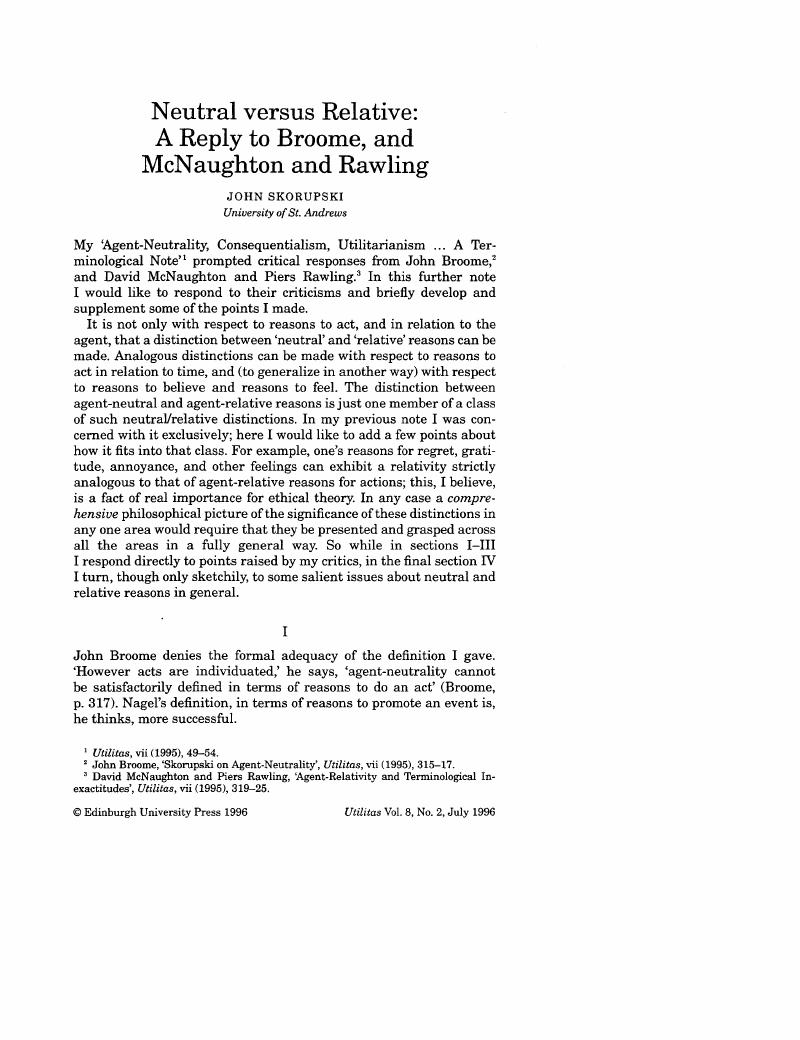Published online by Cambridge University Press: 26 January 2009

1 Utilitas, vii (1995), 49–54Google Scholar.
2 Broome, John, ‘Skorupski on Agent-Neutrality’, Utilitas, vii (1995), 315–17CrossRefGoogle Scholar.
3 McNaughton, David and Rawling, Piers, ‘Agent-Relativity and Terminological Inexactitudes’, Utilitas, vii (1995), 319–25CrossRefGoogle Scholar.
4 Utilitarians would also endorse it as an underived or fundamental reason for x to do y. But they would not hold that it was the only fundamental or underived reason for x to do y. Unlike the egoist (i.e. what I called in my previous note the ‘rational egoist’) the utilitarian does not hold that an agent has to establish that doing y gives an expected benefit to him before he recognizes himself to have reason to do y.
5 It would not be enough for McNaughton and Rawling simply to specify, e.g., that it is that duty which one violates when and only when one tells a lie. They would also have to show that, if it is thus specified, it cannot be stated in agent-neutral form. See their rider, mentioned above on p. 239.
6 The agent-neutral reason-predicate is ‘It is wrong to tell lies and y is a lie’. In other words I am taking it that (x)(It is wrong to tell lies andy is a lie → x has reason not to do y).
7 Critique of Practical Reason, trans, by Beck, Lewis White, New York, 1956, p. 65Google Scholar.
8 Here I am not assuming that intrinsic ethical value is a primitive concept. One can endorse teleological ethics while holding that the primitive concept, in terms of which intrinsic ethical value is defined, is that of a reason for action. Good and evil would still on this conception be defined prior to the moral law, though not prior to the notion of a reason for action.
9 But a misplaced ‘not’ crept into the text: Skorupski, p. 53.
10 Had McNaughton and Rawling said that the ethical, as against morality itself, is intrinsically impartial I would have agreed: this of course is a substantial stand, not a definitional thesis.
11 Their degree of strength is relative to the facts on which they supervene, and this is why in a proper treatment of their logical form they should be represented as relations rather than in the conditional form ‘p → there is reason to …’. On this see Davidson, Donald, ‘How is Weakness of the Will Possible?’, in Essays on Actions and Events, Oxford, 1980, pp. 21–42Google Scholar – though Davidson would not I think agree that it is facts (as against beliefs) that rationalize.
12 As in my previous note I am omitting a variable ranging over choice-situations open to the agent.
13 Here I borrow points from Skorupski, John, ‘Value-pluralism’, in Archard, David, ed., Philosophy and Pluralism, Philosophy, Supplementary Volume, xl, Cambridge, 1996, pp. 101–115CrossRefGoogle Scholar .
14 If one accepts the analysis offered of ‘de se attitudes’ in Lewis, David, ‘Attitudes De Dicto and De Se’ Philosophical Papers: Volume I, Oxford, 1983, pp. 133–59CrossRefGoogle Scholar.
15 I have benefited from discussion with John Broome and Roger Crisp.